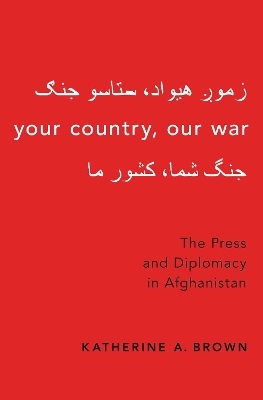
Your Country, Our War
Oxford University Press Inc (Verlag)
978-0-19-087940-2 (ISBN)
Journalists are actors in international relations, mediating communications between governments and publics, but also between the administrations of different countries. American and foreign officials simultaneously consume the work of U.S. journalists and use it in their own thinking about how to conduct their work. As such, journalists play an unofficial diplomatic role. However, the U.S. news media largely amplifies American power. Instead of stimulating greater understanding, the U.S. elite, mainstream press can often widen mistrust as they promote an American worldview and, with the exception of some outliers, reduce the world into a tight security frame in which the U.S. is the hegemon. This has been the case in Afghanistan since 2001, particularly as emerging Afghan journalists have relied significantly on U.S. and other Western news outlets to report events within their government and their country.
Based on eight years of interviews in Kabul, Washington, and New York, Your Country, Our War demonstrates how news has intersected with international politics during the War in Afghanistan and shows the global power and reach of the U.S. news media, especially within the context of the post-9/11 era. It reviews the trajectory of the U.S. news narrative about Afghanistan and America's never-ending war, and the rise of Afghan journalism, from 2001 to 2017. The book also examines the impact of the American news media inside a war theater. It examines how U.S. journalists affected the U.S.-Afghan relationship and chronicles their contribution to the rapid development of a community of Afghan journalists who grappled daily with how to define themselves and their country during a tumultuous and uneven transition from fundamentalist to democratic rule. Providing rich detail about the U.S.-Afghan relationship, especially former President of Afghanistan Hamid Karzai's convictions about the role of the Western press, we begin to understand how journalists are not merely observers to a story; they are participants in it.
Dr. Katherine Brown is the President and CEO of Global Ties U.S. and the Global Ties Foundation, the largest and oldest citizen diplomacy network in the United States. She is also an Adjunct Assistant Professor at Georgetown Universityâs Security Studies Program and a Non-Resident Senior Associate at the Center for Strategic and International Studiesâ (CSIS) Human Rights Initiative. Before joining Global Ties in 2018, Katherine was a Public Policy Manager at Facebook, Inc., where she was also in residence as a 2016â2017 Council on Foreign Relations' (CFR) International Affairs Fellow. From 2013 to 2016, Katherine served as Executive Director of the U.S. Advisory Commission on Public Diplomacy, an office authorized by Congress to appraise and strengthen U.S. engagement activities with foreign citizens. She previously served in the U.S. government as an assistant to the National Security Adviser at the White House; as a Communications Adviser at the U.S. embassy in Kabul; and as a Professional Staff Member for the Committee on Foreign Affairs at the U.S. House of Representatives. Katherine also worked throughout South Asia as a Communications Manager for The Asia Foundation and as one of the original editorial staff members for Bloomberg View, the opinion platform for Bloomberg News. She received her Ph.D. in communications from Columbia University in 2013. Her book, "Your Country, Our War: The Press & Diplomacy in Afghanistan" will be released by Oxford University Press in March 2019. Katherine is a Member of the University of Southern California's Center on Public Diplomacy Board, the Alliance for International Exchange Board, a French American Foundation 2018-2019 Young Leader, and a former term member at the Council on Foreign Relations.
Preface: Kabul
Chapter 1: Hamid Karzai vs. The New York Times
Chapter 2: 9/11 and the American Press
Chapter 3: Afghanistan in Americans' Imagination
Chapter 4: The Afghan Press
Chapter 5: The Modern Afghan Journalist
Chapter 6: U.S. Correspondents in Afghanistan
Chapter 7: Your Country, Our War
Chapter 8: The Diplomatic Dimension of News
Appendix I: Methodology
Appendix II: Interviews
Notes
Bibliography
Index
| Erscheinungsdatum | 06.03.2019 |
|---|---|
| Verlagsort | New York |
| Sprache | englisch |
| Maße | 239 x 160 mm |
| Gewicht | 567 g |
| Themenwelt | Sozialwissenschaften ► Kommunikation / Medien ► Journalistik |
| Sozialwissenschaften ► Politik / Verwaltung ► Europäische / Internationale Politik | |
| ISBN-10 | 0-19-087940-8 / 0190879408 |
| ISBN-13 | 978-0-19-087940-2 / 9780190879402 |
| Zustand | Neuware |
| Haben Sie eine Frage zum Produkt? |
aus dem Bereich


